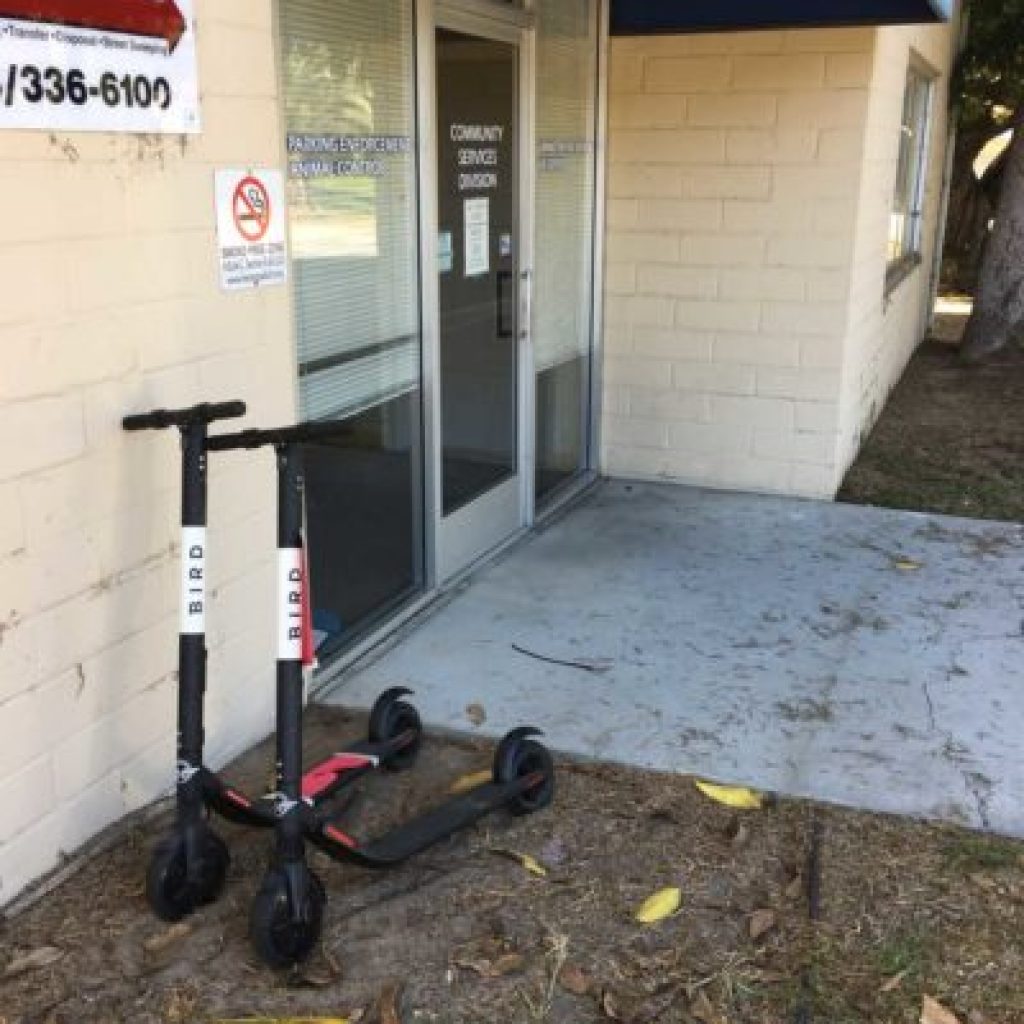Bill aims to boost scooter safety
Bill aims to boost scooter safety
A pair of Bird Scooters left outside the Community Services Division building of Hermosa Beach last fall. A new bill from Assemblymember Al Muratsuchi would keep the devices out of cities without safety regulations. Photo by Ryan McDonald
by Ryan McDonald
Bird and Lime scooters zooming by on The Strand may represent a looming public health risk, and a newly proposed state law could help cities across the state address it.
A bill from Assemblymember Al Muratsuchi, who represents the South Bay in the Legislature, would prevent companies from deploying scooters, e-bikes, and other “shared mobility devices” in areas that have not adopted safety rules for their use. The bill, AB 1286, also requires companies to provide at least $5 million in liability insurance for riders and prohibits companies from including terms of use that would obligate riders to waive their rights to recovery before riding.
Local Offers
“We’ve been hearing concerns not only about riders, but pedestrians too. There is increasing evidence of the potential dangers of some of these shared mobility devices,” Muratsuchi said in an interview.
Bird and Lime did not respond to requests for comment about the legislation.
Muratsuchi’s office cited a study published last month in the Journal of the American Medical Association as being among the inspirations for the bill. The study, “Injuries Associated with Standing Electric Scooter Use,” examined records of patients reporting injuries suffered while riding scooters. Beginning in September 2017, the study tracked a year’s worth of cases in the emergency rooms of two urban Southern California hospitals. The study found 249 patients, whose injuries included sprains, bruises, and fractured bones. Many were treated and released, but 15 were admitted to the hospital for further treatment, two of them to an intensive care unit.
One hundred of the patients had a head injury. Reports from patients and recorded observations of riders in public led the study’s authors to estimate that nearly 95 percent of electric scooter riders in the area were not wearing helmets while riding. Helmets had been legally required during the period the study measured but, due to a new state law that became effective Jan. 1, are no longer mandated for riders over 18.
The scooters have surged in popularity in recent years, and are the most popular of the “shared mobility devices” Muratsuchi’s bill seeks to regulate. Companies such as Bird and Lime allow riders to rent their scooters with a mobile phone app for a flat fee and a per-mile charge. And while the companies — and many elected officials — tout their ability to reduce congestion and connect people to public transit, the devices have produced headaches for municipalities.
“This technology has a lot of promise. It has extraordinary potential to take vehicles off the road, to solve the ‘first-mile, last-mile problem. The flip side is, they also have the ability to create a nuisance,” Hermosa Councilmember Justin Massey said last year.
Because the scooters can be rented and left anywhere, rather than from a fixed location or dock, scooters are often left in the public right of way, blocking access for pedestrians and the disabled. The companies have also taken heat for a precociousness that critics say borders on indifference to government approval. In December of last year, Bird dropped 200 scooters in Redondo Beach in the wee hours of Friday morning, then notified the city by email several hours later, on a day city offices were closed. The move generated scores of complaints to the Redondo City Council and prompted a public apology from the company.
In the absence of guidance from Sacramento, cities and counties across the state have been addressing the devices on their own. Over the past year, each of the Beach Cities has adopted ordinances that temporarily ban the devices while their staffs study more permanent regulations.
But despite the ban, the scooters can still easily be found along Pier Plaza, downtown Manhattan Beach, and other high-traffic locations. This is because the ordinances, which other cities in the region have also adopted, only prevent the companies from dropping the scooters within a jurisdiction. Riders can board a scooter in Santa Monica, which has one of the densest concentrations of rentable scooters in the country, and ride the 15 miles to downtown Hermosa, then leave the scooter on a street corner where it may be picked up by another rider.
Muratsuchi said that, by requiring a safety ordinance to ride a scooter in any city or unincorporated area, his bill was intended to prevent riders from picking up scooters in a place with safety rules, then riding into a neighboring municipality without them. But it is not clear how this would be implemented. Possible ideas include a locking mechanism on the device when it enters an unapproved area, or an electronically assessed fee on the company.
“We are just starting the conversation with industry stakeholders. We’re open to any and all proposals that the industry puts forward, including any and all technological solutions,” Muratsuchi said.

